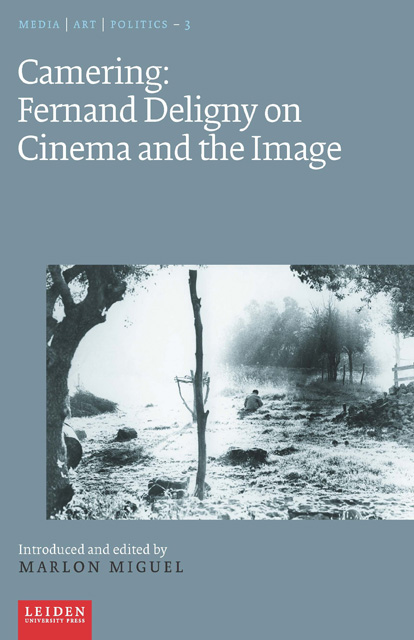Book contents
- Frontmatter
- Contents
- Epigraph [1996]
- Translator’s Note
- General Introduction
- Cinema. Cine-Club [1934]
- The Camera, a Pedagogical Tool [1955]
- He’s Still One of Us [1971]
- Camering [1977]
- Miscreating [1979]
- Camering [1982]
- The Alga and the Fungus [1982]
- Fossils Have a Hard Life: Apropos of the Image [1982]
- Camering [1978-1983]
- The Distinctiveness of the IMAGEs [1988]
- What Is Not Seen (by the Self ) [1990]
- Postface. Minor Gestures, Minor Media
- Frontmatter
- Contents
- Epigraph [1996]
- Translator’s Note
- General Introduction
- Cinema. Cine-Club [1934]
- The Camera, a Pedagogical Tool [1955]
- He’s Still One of Us [1971]
- Camering [1977]
- Miscreating [1979]
- Camering [1982]
- The Alga and the Fungus [1982]
- Fossils Have a Hard Life: Apropos of the Image [1982]
- Camering [1978-1983]
- The Distinctiveness of the IMAGEs [1988]
- What Is Not Seen (by the Self ) [1990]
- Postface. Minor Gestures, Minor Media
Summary
Filmer, to film, seems to me an odd verb. When it's a matter of writing a book, un livre, one doesn't say booking, or livrer. And the verb peindre, to paint, is used and not tableauter, from un tableau, a painting. Here one sees that when it comes to cinema, the final product prevails and becomes a verb. One says raboter, to plane a wooden plank, and not planchelisser, une planche being the noun for that plank.
Since it's a matter of using an instrument called a camera, why doesn't one say camering? It's true that working with a microscope is not called microscoping. But the microscope doesn't produce anything other than a certain way of seeing, while the camera is an image mill; however, contrary to the windmill, the images don't make it go round, or tourner. The camera rolls on its own, and what's said is: ‘On tourne’—‘We’re rolling’.
On? One, in English. Indefinite personal pronoun, third person, fixed, in French always functions as the subject. Could one not have put this any better? It would appear that on is pronounced ‘om’, which comes from homo. ‘Silence, l’homme tourne’—‘Quiet, man's rolling’. That has an altogether different feel to it.
In the word camera, the chamber is visible. The word that follows in the dictionary is camérier, or chamberlain: ‘an officer in the pope's chambers.’ Most cineastes would be very surprised to be called a chamberlain, or worse, a camériste, or chambermaid: ‘a woman who attended to a princess.’ Might that princess be the reigning ideology?
If I hang these remarks on the nail of a surprising infinitive, it's perhaps to indicate that the camera can make something quite different from a film, just as writing can be done without the direct object that is called a book. But then what's the point of activating that mechanism responsible for subterfuge, subterfuge made possible by a fault in our seeing apparatus: retinal persistence? Our gaze slides over the jerks and we’re gone with the movement reproduced. And then the sound joins in, and the colour, which gets to be a bit much.
- Type
- Chapter
- Information
- Camering Fernand Deligny on Cinema and the Image , pp. 165 - 172Publisher: Amsterdam University PressPrint publication year: 2022

